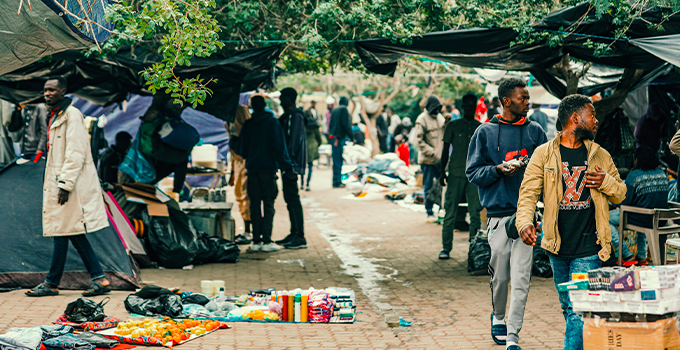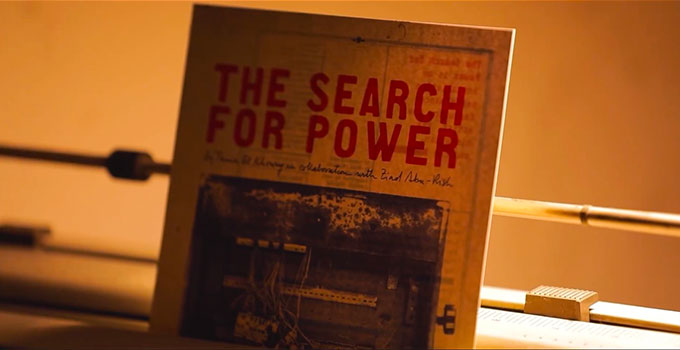
Picture this as a cryptic phenomenon in the modern history of Tunisia, a script that is currently being written by revolting masses. It is not one about the true start of this modern history in 1837 with Ahmed Bey’s access to power and the initiatives he undertook abolishing slavery, 18 years before the US, modernizing education by establishing the Saint Louis school in 1845, with its all-inclusive philosophy, giving equal access to modern means to Tunisia’s Muslims and Jews equally, and relaxing stringent, presumably Islamic laws, which ultimately led to the first constitution anywhere in the Islamic world with the `Ahd al-Amān Promulgation of 1857.
Modern history in our case started in 1956, right after independence, which saw in addition to the national state, liberal laws favoring women and the poor. Our version of modern history also saw torture, intimidation, and harassment of opposition figures so rampant under the previous despot Zine El Abidine Ben Ali, but also common under his predecessor Habib Bourguiba. Then, there is the post-modern version of history, which saw its major political murder this past week, a shooting in broad daylight that eliminated a hated political foe, Chokri Belaid, a leftist activist who was vocal in his criticism of the current government. Tunisians were in awe at the sight of murder. “This cannot be, Tunisians don’t kill each other,” was the reaction of many shocked citizens. Political violence has taken a heinous turn in the birth place of the Arab Spring. The future seems uncertain once more in a country that went through a revolution which promised progress, freedom, employment, but above all human dignity and the right to life.
The Assassination Comes Amid Escalating Violence
The assassination of opposition figure Chokri Belaid highlights the political reality of Tunisia two years after it toppled its dictator. The growing culture of exclusion and intolerance to difference highlights the imminent threat to an already fragile democratic transition in Tunisia. Chokri Belaid was a Leftist politician and one of the leaders of the Popular Front (a coalition of Leftist parties). He was among the most vocal critics of the Ennahda-led Troika government. He was shot dead in broad daylight on Wednesday outside his home in El Menzah, a northern suburb of the capital. Turmoil and escalating violence provide a background to Belaid’s murder. A third of the terror group which attacked the Algerian oil well of In Amenas were Tunisians. Though Belaid did not amass enough votes to get elected on October 23rd 2011, he vigorously continued the fight for democracy and human rights, and above all justice in Tunisia. As a student activist, he was interned in concentration camp of Rjim Maatoug 1985-1987 as punishment. Since then, he held senior positions within the UGET (General Union of Tunisian Students). In 2008, when under Ben Ali riots in the marginalized Gafsa region of southwestern Tunisia were fiercely suppressed, he volunteered, among other lawyers, to defend the jailed protesters. From December 17th (the day of Bouazizi’s self-immolation) till January 14th 2011 (the day the dictator fled the country), he took to the streets along tens of thousands of Tunisians to drive out the despot. He was arrested the day before Ben Ali stepped down. The irony of history has decreed that his demise comes in the days of the “democracy” of the Troika, and not in the darkest days of Ben Ali tyranny.
Easternization, Wahabism, “League for the Protection of the Revolution”, and Failure
Political history repeats itself with irony, so we are told. In this version of history, the seeds of violence were planted shortly after the uprising with the influx of Wahabi preachers (“forced easternization” says Abu Yaareb El Marzouki in the New York Times edition of February 11, 2013.) Weak rule of law, social unrest, insecurity in neighboring Libya, and political rivalries topped it. Further heightening the tensions were the recent attacks on journalists, political officials, artists, trade union activists and even ordinary citizens orchestrated by an organization that allegedly operates to “protect the revolution”, a sort of Islamist militia by the name of “League of the Protection of the Revolution”. The main targets of this “League” have been all those who oppose the current government. Muzzling dissenting voices seems to be the chief purpose of this “revolutionary league” fanning the fire of political instability. This culminated in the murder of last Wednesday when Chokri Belaid became the first victim.
During a talk show on Tunisian TV, on the eve his murder, Belaid warned the government of possible fatal consequences for the growing violence and new forms of never seen before extremism in Tunisian society. Attacking opposition activists, politicians, and “infidels” were the main function of this extremism. The message was simple: The Tunisian government failed to implement policies to prevent this tide of violence in society.
Post-Mortem Riots
The murder of Chokri Belaid triggered spontaneous protests on Wednesday and Thursday near the Ministry of Interior at Habib Bourguiba Avenue with renewed chants “the people want the fall of the regime”. Police fired teargas to disperse the angry protesters. On Friday, despite the rain, hundreds of thousands of Tunisians attended the funeral of Chokri Belaid at the main Jellaz cemetery of Tunis. They chanted slogans against the ruling party, and against its leader: “O Ghannoushi you’re a butcher! And of human souls, you’re nothing but a snatcher!” Not pleased of course, the Islamist leader announced he plans to file lawsuits against anyone who called him a killer. That includes the family of the murdered politician who refused repeated offerings of condolences from the leaders of ruling party, and the thousands of chanters. Make that 1.4 million angry mourners, according to some estimates. In response Ennahda party organized a rally the next day in response. Only 3,000-6,000 showed up, carried in by buses and bribed with money and Choco Tom, a local brand of biscuits. According to the Ministry of Interior one policeman was killed, 59 were injured, and 375 people were arrested during the riots which followed the murder of Chokri Belaid.
A tenth of Tunisia’s almost 11 million inhabitants mourned the departed leader in a day reminiscent of a famous January 14th 2011, many with one question on the mind: “Who’s next? And what will the gates of hell bring? Will Belaid‘s assassination usher a new era of instability characterized by political violence and massive bloodshed? In this version of post-modern history, will it be crypts, gloom and doom?
Tunisia in Crisis, The PM’s Government of Technocrats, and a Ruling Party that Simply Says No
“Prime Minister Jebali deserves the support for all for his bold decision” reads one of the widely shared facebook status update. It’s his “I chose thee patria” status that caught the eyes of thousands of facebookers. The Prime Minister plans to propose an interim government of technocracts that would replace the coalition government led by his own Ennahda party. The announcement took many by surprise especially its timing being the same day of the political murder.
“After the failure of negotiations between parties on a cabinet reshuffle, I have decided to form a government of technocrats” he said. The move reflected the opposition‘s aspirations, but was firmly rejected by Ennahda. The party argued that the Prime Minister had no legal right to dissolve the government. Forming a non-partisan government was not an option either. The Saturday rally organized by Ennahda sent a strong message to the PM against his plan of a new cabinet of technocrats. The Congress for the Republic (CPR), a partner in the coalition government and a strong opponent to the idea of a government of technocrats has reversed its decision on Monday to withdraw from the Troika. In contrast, Ettakakol, the other junior party in the Troika expressed some support for Jebali‘s proposal.
In the climate of mistrust to the judicial system and the security institutions, the finger of blame is pointed in every direction. The brother of Chokri Belaid accused Rached Ghannouchi and his Ennahda party of assassination. Supporters of the ruling party accused remnants of the old regime. Conspiracy theorists blame France and Israel for the murder. Tunisia seems to serve as a barometer for a boiling region and a gauge of the process of democratization in Arab Spring countries. If violence and extremism fully take over in Tunisia it will be full fledged the civil war.





There is a contradiction between “The Saturday rally organized by Ennahda sent a strong message to the PM against his plan of a new cabinet of technocrats. ” and earlier in that article where it says only 3-6000 showed up and mostly only because they were bribed to do so.
It could hardly have been a strong message could it ?